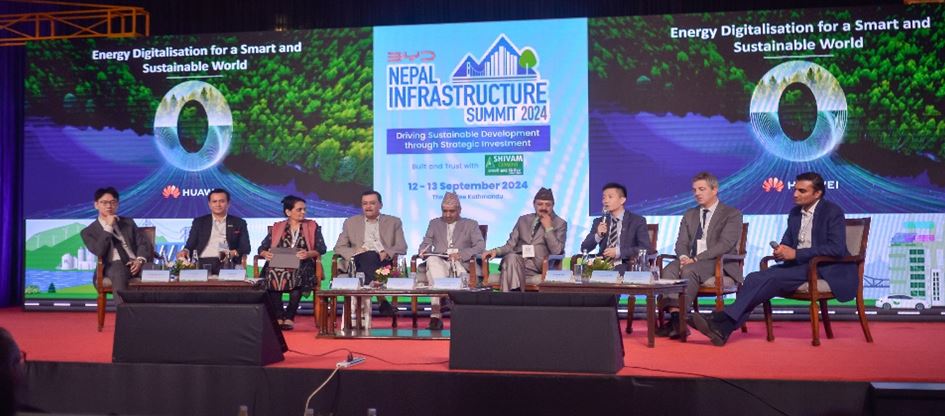KATHMANDU: Huawei Digital Power concluded its successful participation at the Nepal Infrastructure Summit 2024, organized by the Confederation of Nepalese Industries (CNI). The two-day event, held from September 12th -13th in Kathmandu, gathered policymakers, industry leaders, and innovators from around the world to discuss Nepal’s infrastructure development, with a key focus on sustainability, green energy, and digital transformation. This year’s summit emphasized the critical role of clean energy and digitalization in shaping the future of Nepal’s infrastructure.
During the Energy and Water Resources panel discussion on September 12th, Chen Yong, President of Huawei APAC Digital Power Smart PV & ESS, presented on the topic “Energy Digitalization for a Smart and Sustainable World.” His insights emphasized Huawei’s role in the global energy transition, integrating digital solutions with power electronics to deliver clean energy and drive the green revolution.
“The global energy landscape is evolving rapidly due to climate change imperatives and the global need for sustainable growth,” Chen Yong remarked. “Huawei is committed to supporting carbon neutrality by integrating low-carbon power generation, electric energy consumption, and digitalization to empower green transformation. The 5th Industrial Revolution (IR), which aligns with low-carbon and intelligent technologies, brings us closer to a greener world.”
Chen Yong highlighted that Huawei’s Smart PV Solutions, powered by intelligence and cloud computing, optimize the performance of solar power plants, ensuring maximum energy yield while minimizing operational costs.
He further elaborated on Huawei’s Smart Battery Energy Storage System (BESS), which enhances energy storage efficiency, reduces losses, and seamlessly integrates with renewable energy sources. He also introduced Huawei’s liquid-cooled ultra-fast charging solution, which provides rapid and convenient EV charging, accelerating the adoption of electric vehicles.
Key Takeaways from Chen Yong’s Presentation:
-The global energy landscape is transforming due to carbon neutrality goals and net-zero pledges from economies worldwide.
– Low-carbon power generation, combined with digitalization, offers immense potential for green transformation.
– The transition from high carbon to low carbon and ultimately to net-zero carbon is essential for a sustainable future.
– The adoption of renewable energy technology is not optional; it is imperative for future economic growth and environmental sustainability.
Huawei Digital Power’s participation in the summit highlighted its contributions to Nepal’s green energy transition through its Smart PV and ESS solutions. These innovations align with Nepal’s goals of leveraging natural resources more efficiently to support economic growth and sustainability.
As the summit concluded, Huawei Digital Power reaffirmed its dedication to empowering Nepal with advanced digital power solutions. Through partnerships with local stakeholders, Huawei Digital Power aims to contribute to the nation’s journey toward a green and digitally empowered future.

